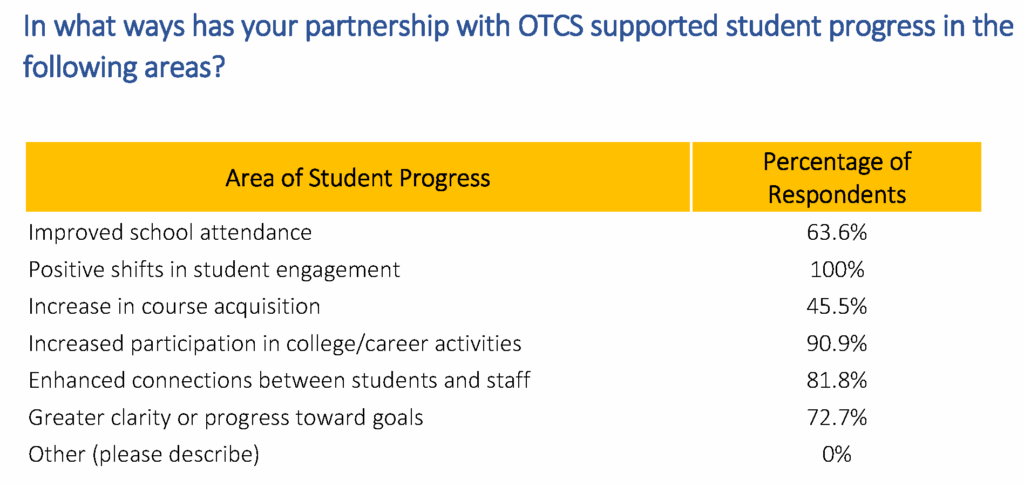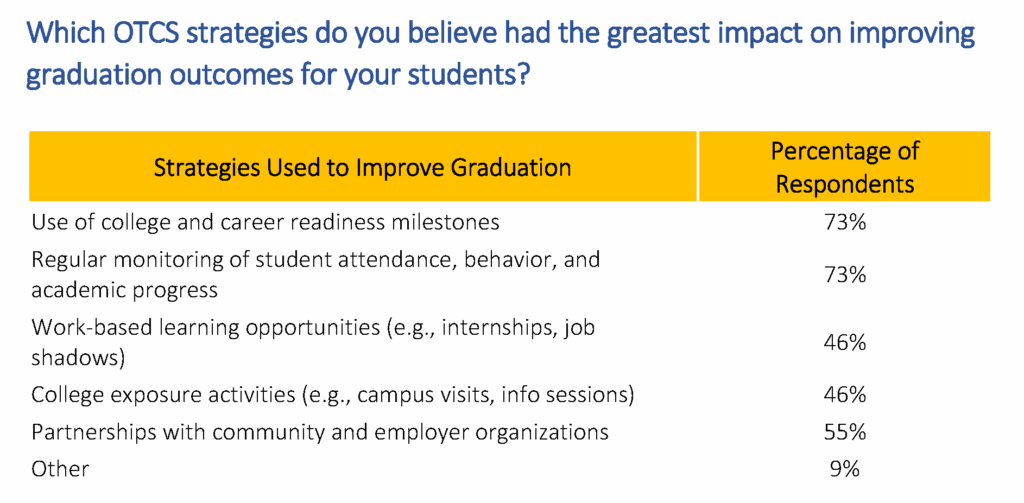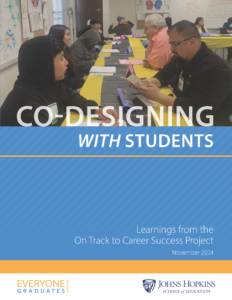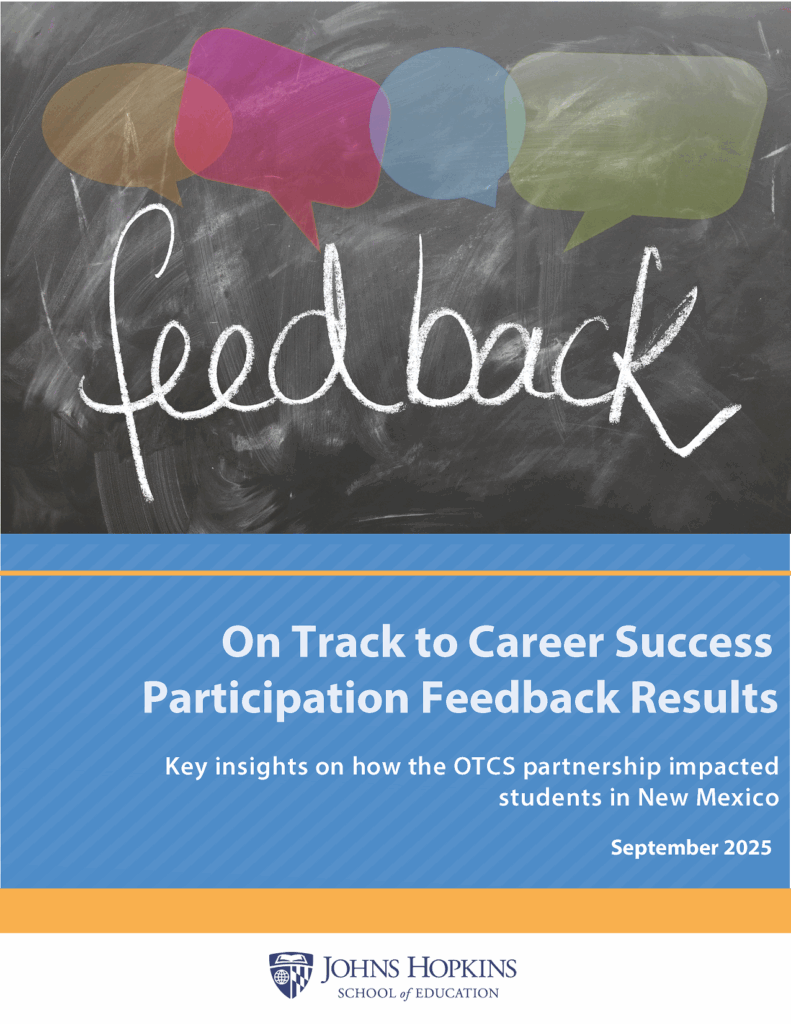
On Track to Career Success Participation Feedback Results
On Track to Career Success has prepared The On Track to Career Success Participation Feedback Results. It reports the key insights on how the OTCS partnership impacted students in New Mexico.
The objective is to understand the experiences and the impact of participation, providing insights that will guide the evolution of the framework and its national implementation. The results may serve in shaping the future and ensuring it effectively supports broader use. Six school sites participated in the survey, including students, teachers, counselors, administrators, and key community partners.
Download the Report
- 100% of respondents feel that the program improved student engagement
- 91% of respondents indicated an increase in student participation in college/career activities
- 82% of respondents shared an increase in connections made between students and school/community/employment partners
- 73% of respondents reported the greatest impact was the use of the National Milestones to improve college and career readiness


On Track to Career Success Playbook
This Playbook is designed primarily for secondary schools and their community organizations, higher education peers, and workforce partners. Our hope is that the Playbook serves as a practical and applicable resource for most types of school settings, including those that serve students from diverse socioeconomic backgrounds.
The Playbook is the result of engaging students and educators in the process of design thinking while aiming for greater equity through co-creation. The Playbook seeks to honor and value the voices of the students, families, community members, and school-based educators who collaborated with us in implementing elements of the OTCS with their communities.
The Playbook reflects collaborations with stakeholders across languages (English and Spanish), ethnic and racial identities, gender identity, age, and educational backgrounds (i.e., college- and non-college-educated caregivers). Furthermore, the Playbook highlights how students were able to articulate their perspectives and co-direct collective activities in co-designing the unique pathways for their school’s new learning environments.
The Playbook can be used as a guide for customized support and coaching of the OTCS Framework while adjusting for the realities of each landscape. You can co-design the paths that work best for your community as the Playbook offers tools and resources that help build the skills and capacities of students, educators, parents, and partners to enact the OTCS Framework.
Follow link to read the Playbook
Co-Designing with Students: Learnings from the On Track to Career Success Project
This paper highlights:

• The three elements of the OTCS framework that have guided collaborations with school partners:
• The three elements of the OTCS framework that have guided collaborations with school partners:
- Milestones: evidence-based academic, social-emotional, college and career milestones for students in grades 9-12
- Student Success Systems: to monitor and respond to keep all students on the path to career success.
- Pathways to Career Success: providing all students with a series of college and career explorations, experiences, applications, and engagements.
- Case studies that illustrate collaborations with school partners and describe lessons and challenges faced by their school communities.
- The processes and methodologies that guided each school’s individual co-created implementation efforts.
- The resources that are at the heart of the project’s efforts to co-design with students and the educators, families, and communities who support them.
This paper will be of value to educators, funders interested in systemic educational reform, workforce providers, researchers, higher education leaders, and other community-based partners.
The OTCS project involves systems change work that usually starts with policy makers, business leaders, and school district administrators. The OTCS is upending this practice by uplifting and valuing the voices of students, families, community members, and school-based educators as co-designers and co-creators of future pathways.
Follow the link to read the full report
Insights from a Pandemic: Reflections from the On Track to Career Success Project
After extensive planning and work building multiple partnerships, the On Track to Career Success (OTCS) project was launched in Albuquerque, New Mexico, and New Orleans, Louisiana in early 2020. The OTCS project works with partner schools and communities to create a framework to support all students, including the most marginalized, on a path to high school graduation, post-secondary schooling and/or training, and a career with a family-supporting wage.
At about the same time, the COVID-19 pandemic hit and disrupted so much of our lives. Carefully designed plans were pushed aside amid new health restrictions. The next two years were defined by uncertainty and stress, as schools moved to online instruction and then hybrid schooling, forcing educators, nonprofit partners, and community members across the country to reimagine education. Such challenges were perhaps steeper at the OTCS schools, which serve Black, indigenous, and other people of color in historically underserved communities that were among the hardest hit by the pandemic.
Despite these challenges, five key insights were gleaned from the project’s first two years and are summarized in the report, Pandemic Insights: Reflections from the On Track to Career Success Project, and will be of value to educators, funders interested in systemic educational reform, workforce providers, researchers, and others:
- Schools Play a Critical Role Connecting Students and Staff — An Essential Building Block for Emotional Well-Being and Success
- Relationship Building and a Focus on People’s Well-being are Essential
- Flexibility and Adaptation are Necessary Ingredients
- Building and Sustaining Partnerships Requires Ongoing Work and a Shared Context
- The Pandemic Promoted Rich Conversations as Schools Looked for New Solutions
Follow this link to read the full report.
On Track to Career Success Ensuring Postsecondary Education and Work for All Students
To succeed in the 21st century, all students need to earn a high school diploma and have a supported postsecondary pathway that prepares them in their career. Unfortunately, access to these opportunities is not equitably spread throughout our nation. In our neighborhoods and communities with the highest needs, they are least frequently present. Implementation of the framework is designed to improve high school graduation rates, especially among the highest needs students, and greatly increase the number of graduates who successfully continue their schooling or training and find employment, even in the most impacted locales.
Partnerships between high schools, districts, youth, community organizations, workforce development organizations, employers, and postsecondary education institutions (including technical, 2-year, and 4-year) collaboratively build systems both within and outside of local high schools to ensure all students have the education, work experiences, and the support to be successful in their adult lives.
United by a commitment to racial equity, shared values, and a vision to prepare students to be future ready, youth representatives serve as key partners to co-design new pathways and experiences, and foster a meaningful increase in student self-efficacy and leadership.
Project Vision
Individuals two years beyond high school have graduated high school possessing the schooling, training, and work experiences to attain and succeed in careers with family supporting wages.
Project Goal
Prototype and implement an equitable career success framework spanning grades 9 – 14, connected to high school communities that enable all students, including those facing the toughest challenges, to build educational, social-emotional, and workplace skills that lead to success in careers with family supporting wages.
Project Partners
Partners help to design and build a system of opportunities and supports situated both within and outside of the high school during grades 9 – 14. Through dynamic collaboration focused on expanding student support and opportunities, all students will have the pre- and post-graduation experiences that will guide them to a successful career.






